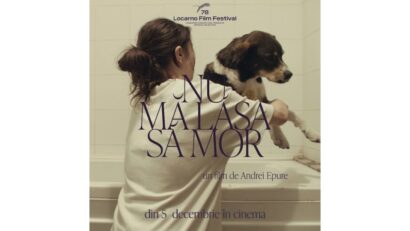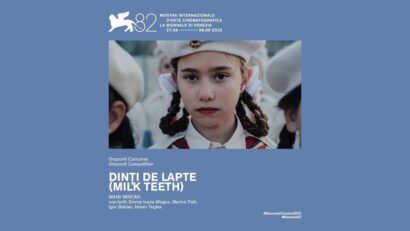The Iasi International Theater Festival for Young Audience
The Iasi International Theater Festival for Young Audience has reached its 11th edition

Luana Pleşea, 10.11.2018, 15:44
Organized by the
‘Luceafarul’ Theater for Children and Youth, the festival addresses spectators
with a young spirit, irrespective of their age. The program is very daring and
targets all categories of audience.
Oltiţa Cîntec is
the artistic director of the ‘Luceafarul’ Theater and the selector of the
festival that took place in early October.
Oltiţa Cîntec: Our festival has a unique identity both in
the region and in the country, and it targets young audiences. Young means
young spirit, a young cultural age, no matter the people’s biological age.
Their youth consists in their openness towards new, unusual cultural
experiences. We target those audiences who have known and still know how to
preserve the young dimension of their personality, which should be fostered all
throughout one’s life, no matter the age.
A young audience
needs new challenges. This year, the theme of the festival was ‘Otherwise’.
Oltiţa Cîntec: Every year we come up with a new theme, a
new motto for our events, which are very diverse. Events start at 9 a.m. every
day and end late at night. Mornings are for children while the midday and the
afternoon are dedicated to specialists. The evenings are for the audiences over
14, whose cultural age is hard to define. We have a very dense, varied
schedule. We have daring forms of show – participatory theatre, documentary
theater, reading shows and street shows.
The festival
also includes performance art. This year’s program included ‘NOK!NOK!’ a free
adaptation of the book ‘The Year of Magical Thinking’ by Joan Didion. The
project is part of the Performing Arts Program of the National Contemporary Art
Museum and the concept belongs to actress Nicoleta Lefter who is also the
scriptwriter and director of the show:
Nicoleta Lefter:
Together with actress Flavia Giurgiu,
who is playing in the show, with Ioana Bodale, a visual artist, and Alexandru
Raptis, the sound engineer, we conceived a performance about the fear of
loneliness. About how deep loneliness can penetrate a human being to reduce him
or her to numbness and lack of reaction. And we started from the case described
in the book, in which a famous writer loses her husband while she is preparing
dinner. Everything that follows is a flow of thoughts, like an analysis of each
reaction, each gesture, and each heartbeat behind this fear of loneliness.
Oltiţa Cîntec
believes that the times when spectators simply sat in their chairs in
contemplation are long gone and that audience should be ‘jostled’ by the dramatic
art. Thus, the program of the International Theater Festival for Young Audience
also included shows that built on direct interaction with the audience.
‘The Author’ by
Tim Crouch directed by Bobi Pricop, a production of the Marin Sorescu National
Theater of Craiova is certainly a challenging show. It is the 2nd
text of the British playwright after An Oak Tree staged in Piatra Neamt by
the young director. A playwright who revolutionized the relationship between
the audience and the stage performance, and between the author and the stage
performance Bobi Pricop says. What prompted him to come up with this formula
for his stage performance?
Bobi Pricop: I think that, being a sort of control
freak, these attempts and the encounter with this playwright whom I find
fabulous, who proposes such great risk and such an intense unknown, is an
exercise of understanding how I work and how I succeed in managing this risk…
In the Author there is no set design at all, there is no acting area, there
are only two large benches for spectators facing one another, with no space
between them whatsoever. The show begins with ten minutes of silence, when
eventually, people from the audience begin wondering what’s all this about,
what is going on, whether something is going to start, or not… In the end
actors are being recognized by members of the audience…
‘I’ve been to
lots of stage performances where I had the feeling that the audience, as well
as I, get really bored. That theater has become museum-like’, young stage
director Cristian Ban confessed. At the festival in Iasi, Ban was invited with
his stage performance Let us know each other better, based on a collective
script and produced by the Ioan Slavici Classical Theater in Arad. ‘Have you
ever stolen anything?’, ‘What do you think?’ or ‘Are you happy?’… These are the
questions the four actors in the cast have launched for the audience, in an
unusual stage endeavor, a live survey, but for which the answers are anonymous. Speaking about that, here is stage director
Cristian Ban.
Cristian Ban: I wanted to put up such a show that the
audience never stops thinking about it. So that it may be like an inner stage
show everyone experiences in their own way. I wanted to talk, at the theater,
about things we don’t speak about. Adult
things, or more intimate things, having to do with money, sex, happiness…Things
you get to talk about only with your very close friends. The challenge for us
was to not mince our words and speak about them outright, for one hour, at the
theater.
The
International Theater festival for Young Audiences in Iasi this year extended
to 18 venues across the city, conventional or non-conventional spaces, indoor
or outdoor premises.
Oltita Cintec: Obviously the focus is the Luceafarul
Theater, with its two halls, but we ‘colonized’ the whole city with stage
performances of all sorts. We also wanted to bring theatrical gifts to those
who these days are in the hospital, for instance…because we want our festival,
just like any other genuine festival, to be a celebration, we want it to be a
joy for everybody. We acted on the street, on the sidewalk; we acted in malls,
because, in addition to the public coming to the theater on a regular basis, we
were the ones who went out the lookout for an audience that, for various
reasons, does not manage to set foot in a theater. And then I said the only
thing we could do was to go look for an audience ourselves, in those unconventional
areas…I am positive that many of the people in the audience, through those
unconventional shows, discovered theater, discovered that it is not a starched
coat, too tight at the neck or waist, quite the contrary, it is a vivid,
extraordinary art, which builds emotional bridges with the audience, and that
is the most important thing of all.






























